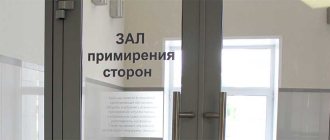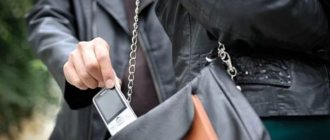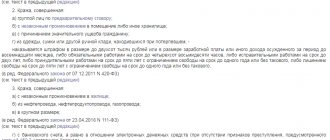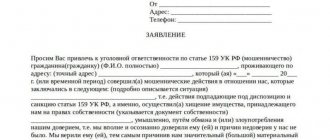○ Legal theft
“Theft is the secret theft of someone else’s property” - this is the interpretation given by the law in Art.
158 of the Criminal Code of the Russian Federation. Theft always causes material damage to the victim. When committing theft, the criminal has a specific goal - to enrich himself. He understands that he is committing illegal actions that are prohibited by law. He also realizes that he is stealing in secret from the victim and others. Even if the thief is noticed, but he does not guess about it, his actions will contain the elements of Art. 158 of the Criminal Code of the Russian Federation.
For committing an action provided for in Part 1 of this article, one of the following penalties is imposed:
- Penalties not exceeding 80,000 rubles or within the limits of the convicted person’s certain income for six months.
- Mandatory work within 360 hours.
- Correctional work, lasting up to 12 months.
- Freedom may be limited or forced labor imposed for up to 2 years.
- Imprisonment for up to 4 months.
- Imprisonment for up to 2 years.
A criminal case is initiated when the value of the stolen property exceeds 1,000 rubles, and there are no additional signs of theft in the actions of the offender.
Qualifying features of Art. 158 of the Criminal Code of the Russian Federation are reflected in three parts of this norm.
Liability under Part 2 of Art. 158 of the Criminal Code of the Russian Federation occurs if:
- A group of people, that is, more than 2 people, is involved in the crime. At the same time, they must plan their actions in advance.
- The citizen suffered significant damage. That is, the total cost of the stolen property must be at least 5,000 rubles. Speaking of significance, law enforcement agencies determine the financial situation of the applicant.
- There is illegal entry into the premises or other storage place. It does not matter the method of entry - whether the door was opened or the lock was broken.
- Property is stolen from clothes, bags or other luggage that are with the victim.
These actions entail the following penalties:
- Penalties up to 200,000 rubles or a fine that is a multiple of the perpetrator’s other earnings for 1.6 years.
- Up to 480 hours of mandatory work.
- Correctional labor for up to 2 years.
- Up to 5 years of forced labor with or without restriction of freedom for a year.
- Detention for up to 5 years.
Separately, in Part 3 of Art. 158 of the Criminal Code of the Russian Federation, the legislator distinguishes the theft of property from someone else’s home; theft from an oil pipeline, oil product pipeline or gas pipeline; as well as theft in the amount of more than 250,000 rubles, which is regarded as large.
For this, the court may impose the following sanctions:
- A fine of 100,000 rubles to half a million, or equal to any income of the convicted person ranging from one to 3 years.
- Forced labor for a period of up to 5 years, in addition, restriction of freedom is allowed for 1.6 years;
- imprisonment for a term of up to 6 years, together with a fine of up to 80,000 rubles or equal to the convicted person’s earnings for six months, as well as restriction of freedom for up to 1.6 years. The judge may refuse additional sanctions.
Part 4 art. 158 of the Criminal Code of the Russian Federation contains the following qualifying criteria: theft by an organized group or in the amount of more than 1,000,000 rubles, which is considered especially large. The offender can be imprisoned for up to 10 years. In addition, the presiding judge has the right to impose a fine of up to 1,000,000 rubles or a multiple of the income of the sentenced person for 5 years. In addition, a restriction of freedom is provided for within 2 years.
○ I didn’t commit theft, how can I prove my innocence?
As we see, the responsibility for criminal acts is quite severe. But difficult situations often arise when an innocent person is accused. This may be due to the low quality of the preliminary investigation, when the authorized body does not take all measures to establish the truth in the case.
Then you will have to prove your innocence on your own or with the help of a lawyer.
If you are accused of a crime that you did not commit, you must:
- During interrogation, insist on your innocence, inform the investigator or interrogator who can confirm the testimony.
- Find as many witnesses as possible who can indirectly confirm innocence. For example, if you were at work during the theft, then it is necessary to interrogate as many colleagues as possible who will confirm this fact.
- If there are video cameras at the workplace, in a shopping center or other premises where you were at the time the crime was committed, then you need to petition the investigator to seize the recordings from the CCTV cameras. The records must be included in the criminal case file.
- Submit a petition to the authorized body to produce “billing”. That is, you can use your mobile phone to determine your location during the theft. To do this, it is enough to provide the investigator with your subscriber number and IMEI of your mobile phone.
- If you are a car enthusiast and were driving at the time of the theft, then it would be a good idea to include recordings from CCTV cameras installed on the road into your case.
- Take a lie detector test. This can be done independently in a commercial organization, or undergo an examination based on the decision of the investigator.
- Attach to the materials of the criminal case positive characteristics from your place of work, study, neighbors, as well as information about your financial situation.
All requests for individual investigative actions must be submitted in writing, sent through the office or by mail. You can submit the application in person, but so that you have a second copy with a note of acceptance.
If your application is refused, you can appeal it to the head of the law enforcement agency, the prosecutor's office or in court.
✔ Found a phone on the street and was charged
If you find a mobile phone on the street and you are accused of stealing it, you need to prove your innocence. To do this, it is advisable to emphasize that the phone is a find. This is evidenced by:
- There is no real possibility of returning the phone to its rightful owner, for example, because the phone does not have any contacts or a SIM card.
- The finder does not know who the phone belongs to and cannot guess about it.
- The situation where the device was found does not indicate that the owner was away for a while and will return soon.
- There is no selfish goal of getting rich, since the phone was found by chance, unexpectedly for the finder.
During the interview or interrogation, report where, when and under what circumstances the phone was found. During your testimony, tell us that you did not plan to use it, stored it and wanted to return it to the owner or hand it over to the authorities.
You should not immediately agree with the accusation. Prove that the phone was actually found and not stolen, then the initiation of a criminal case will be denied. And the case initiated is subject to termination, since there are civil legal relations.
✔ The security guard at the store called me a thief, what should I do?
The guards are interested in catching the “thief.” For this they receive a certain remuneration from the employer. Therefore, anyone can be under suspicion. In this situation, it is important to know that:
- Security guards do not have the right to search a suspect without police officers.
- A security officer can detain a person until the police arrive. But the detention must be justified, for example, CCTV cameras recorded the theft, or there were witnesses to illegal actions.
Wait for authorities or call the police yourself to prove your innocence.
In the future, you have every right to go to court with a claim for compensation for moral damage. In this case, it is also possible to demand compensation for material damage, for example, if during the arrest, the guard tore your clothes or damaged your other property.
Accused of theft for found phone
According to statistics from law enforcement agencies, a third of all property crimes committed are associated with various types of phone thefts. In response to an even greater number of complaints about the theft of phones by police officers, a decision is made to refuse to initiate a criminal case due to a banal loss.
Incorrect differentiation between a criminal offense (Article 158 of the Criminal Code of the Russian Federation) - theft and civil law relations associated with the discovery of a find - a mobile phone often leads to the unreasonable and illegal prosecution of a person.
Table 1. Comparative characteristics of theft and discovery as public acts
| THEFT | NODHOKA | |
| Item | Someone else's property belonging to the owner | Property accidentally removed from the owner's possession |
| Objective side | Confiscation of property from the owner, causing him material harm | Material damage is not caused, since the property left the owner’s possession at the time of loss. A valuable item is disposed of, the owner of which is unknown. |
| Subjective side | Intentional commission of illegal acts | Coincidence |
| Responsibility under the law | Criminal | Not provided |
○ How to appeal an accusation and punish for libel?
Any decision of the investigator or inquiry officer can be appealed on the basis of the current law:
- Contact the head of the investigative agency or inquiry with a complaint about the employee’s actions. The manager has the right to cancel any decision of a subordinate.
- File a complaint with the prosecutor's office or court in accordance with Art. 125 Code of Criminal Procedure of the Russian Federation.
First, contact officials and competent authorities at your location, and then contact higher authorities. For example, first appeal the actions to the head of the investigation of the Department of the Ministry of Internal Affairs of Russia, and at the next stage write a complaint to the regional Department of the Ministry of Internal Affairs of Russia.
Having considered the complaint, the competent authority has the right to satisfy it and then the charge will be dropped.
If you were accused of theft orally, in the presence of witnesses, and your non-involvement in it was proven, then feel free to write a statement of slander. Article 128.1 of the Criminal Code of the Russian Federation states that “slander is the dissemination of deliberately false information that discredits the honor and dignity of another person or undermines his reputation.” You can write a statement to the police or send a statement of claim to the court.
In it, indicate in what form, under what circumstances the accusation was made, and whether other citizens heard it. The most difficult, but also extremely important, is to prove that the lie was deliberate and it was conveyed to strangers.
Otherwise, the composition of Art. 128.1 of the Criminal Code of the Russian Federation is excluded.
Actions if you lose your phone
Owners left without their phones contact the police with three types of statements:
- Statement regarding loss of phone.
In this case, the owner hopes that the police will record the individual number and notify the applicant if a loss is discovered. At the same time, law enforcement agencies do not always take active search efforts. This does not always satisfy the applicants and two other types of applications appear.
- A statement of loss, when the owner does not exclude both the fact of loss and the fact of theft.
In this case, the police conduct initial search operations in order to establish the location of the phone and the circumstances of its loss - talking with eyewitnesses.
If the presence of signs of a crime is reliably established, then a criminal case is initiated into the theft.
The basis for initiating a criminal case under Article 158 of the Criminal Code of the Russian Federation “Theft” based on the loss of a phone can be:
- cut packages, pockets or bags in which the device could be located;
- the loss of a mobile phone in a confined space in the presence of a circle of people who are aware of who it belongs to;
- the phone disappeared under circumstances where the owner left it for a while, that is, the property was not lost, but abandoned.
If, upon clarifying the circumstances of the loss, the fact of theft is not reliably established, the search for it is stopped.
- Report of phone theft.
After checking the circumstances specified in the application, the police initiate a criminal case, establish the location of the phone and the person who has it. In this case, it most often happens that the one who found the mobile was accused of theft.
In other words, the reason why a person who finds a mobile phone is accused of theft is the owner’s incorrect assessment of the circumstances of the loss of his property, or a deliberate distortion of the entire situation in order to find and return his loss.
○ What to do if a criminal case has been opened?
Theft is a crime that is difficult to prove. To initiate a criminal case, it is enough to receive a statement and explanation from the victim about the event. Finding a mobile phone is not difficult for law enforcement agencies. In this case, the finder may become accused in a criminal case. If this situation affects you, then use all means to prove your innocence.
The law states that the burden of proof lies with the investigation, but in practice it is better to be proactive and defend your case. For this purpose:
- Hire a lawyer to act as your advocate.
- Provide the investigator or interrogator with all possible evidence of non-involvement. For example, independently contact the Administration of the shopping center where you were at the time of the theft and ask them for video recordings. But don't count on a positive response.
- The decision to initiate a criminal case, as well as the decision to involve him as an accused or suspect, will necessarily contain information about the place and time of the crime. Using this information, find witnesses who will prove that you were with them at that particular time. Or who know what you were doing during this period of time.
- Submit as many petitions as possible during the investigation, demand that those investigative actions and operational search activities be carried out that will confirm your alibi. If your request is denied, appeal the decision of the investigator or inquiry officer.
If at the preliminary investigation stage it was not possible to terminate the criminal prosecution and the material is sent to court, do not despair. You will be given the opportunity to familiarize yourself with all the materials of the criminal case, you will be able to make photocopies of all documents. Based on the information received, you and your lawyer will be able to build a line of defense in court. You will have a new opportunity to prove your innocence and appeal the verdict, if it takes place.
This algorithm is suitable for innocent persons.
If you are involved in a crime, then actions should be aimed at mitigating the punishment or terminating the criminal case through reconciliation of the parties. Then proceed according to a different scheme:
- Voluntarily write a confession, where you confess to committing the theft.
- During interrogations, give truthful testimony and show that you repent.
- Return the stolen property or help establish its location. For example, tell who the item was sold to and how to find a buyer.
- Compensate for material damage caused and, if necessary, moral damage.
A full admission of guilt will mitigate the punishment. In addition, you will have the opportunity to make peace with the victim during the investigation or in court. Then the case will be dismissed pending reconciliation of the parties.
How to proceed?
- look who is present . Perhaps these people know the confusion and can give him contact;
- contact the administration of the institution where you are located. If it's a public place, ask to make an announcement over the speakerphone. Leave your find with the administration of the establishment;
- see if the gadget you found turns on . If you succeed, enter your contacts book. Call these people, do they know whose phone number it is and how to find this person now?
- If you can’t find the owner’s potential acquaintances or turn on the device, contact the police and give them what you found.
Do not under any circumstances try to sell the item.
This argument can work against you if the owner has already filed a statement of loss or theft, there is a clear benefit , and the seller or owner of the purchase can easily identify the person who handed over the gadget.
○ Advice from a lawyer:
✔ At work I have access to the director’s office, a large amount of money recently disappeared from the safe, they accuse me, what should I do?
If a criminal case has been initiated against you, but you are innocent, then never write a confession. Even if you are under pressure from law enforcement agencies or other participants in the criminal case. Practice shows that refusal to appear and initial confessions does not bring favorable consequences. In most of these cases, the case ends in a guilty verdict.
✔ I found a large sum of money, if I don’t return it to the owner, whom I don’t know, will I be blamed?
If you find any property on the street, take measures to return it to the owner. If you cannot identify the owner yourself, then take the find to the police or local government. You are not obligated to transfer the find to anyone other than the owner. You can keep the item at your place, but you will be responsible for its safety. After six months, if the owner is not identified, then in accordance with the norms of the Civil Code of the Russian Federation you will become the legal owner.
Video
How to behave if you are falsely accused of theft. Criminal lawyer Dmitry Efremov tells.
Published by: Vadim Kalyuzhny , specialist of the TopYurist.RU portal
What should you do if found?
The grounds for acquiring property rights are described in detail in Chapter. 14 of the Civil Code of the Russian Federation, including for ownerless things. The law also regulates the procedure for detecting objects.
An abandoned item is different from something temporarily left unattended or lost. The character is determined by the appearance - useful consumer properties are lost, as well as by location - landfill, other waste receptacles.
In case of theft, robbery and robbery, property is stolen without the consent of the owner. In case of embezzlement and fraud, the owner himself transfers the items to the attacker. When someone else's property is found and appropriated, the lost item is reclaimed for one's own benefit.
If you find someone else's phone, consult our specialists on the algorithm for further actions by contacting them by phone or through the website.










